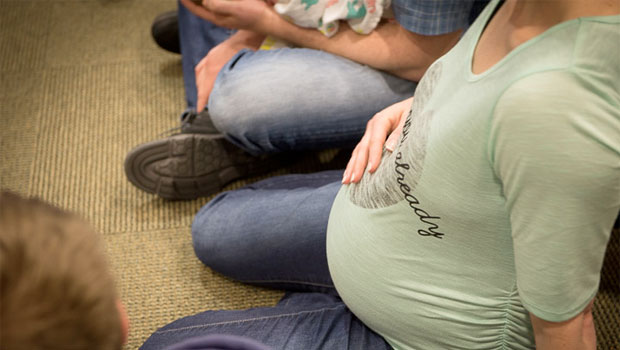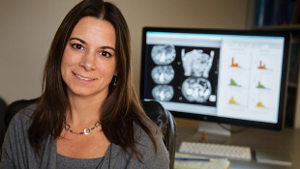CT scan use in pregnancy rose in US and Canada over two decades

Large, multicenter study among first to quantify exposure to ionizing radiation during pregnancy.
SEATTLE, July 24, 2019—Use of computed tomography (CT) scans during pregnancy—which exposes mothers and fetuses to ionizing radiation—has increased significantly over 21 years in the United States and Ontario, Canada.
According to a large, multicenter study of advanced medical imaging in pregnancy, published today in JAMA Network Open, CT scans were performed in about 0.8 percent of pregnancies in the United States and 0.4 percent in Ontario in 2016. The rates of use increased nearly fourfold in the United States and doubled in Ontario over the 21 years of the study, according to “Trends in medical imaging during pregnancy in the United States and Ontario, Canada, 1996–2016.”
“Most pregnant women get routine ultrasound to monitor fetal growth, which delivers no ionizing radiation,” said co-lead author Diana L. Miglioretti, PhD, biostatistics professor at the University of California, Davis, Department of Public Health Sciences, and senior investigator at Kaiser Permanente Washington Health Research Institute (KPWHRI). “But occasionally doctors may want to use advanced imaging to detect or rule out a serious medical condition of the expectant mother, most often pulmonary embolism, brain trauma or aneurysm, or appendicitis.”
Researchers with the National Cancer Institute (NCI)’s Radiation-Induced Cancers study reviewed data from six integrated health care systems in the United States and Ontario, Canada. The study included 2.2 million women who had 3.5 million live births between 1996 and 2016. The researchers tracked the combined use of advanced medical imaging during pregnancy, including CT scans, radiography, angiography/fluoroscopy, and nuclear medicine, which involve ionizing radiation—and magnetic resonance imaging, or MRI, which does not. Ultrasound was not included in the study.
Rates of CT scanning during pregnancy in the United States started leveling off in 2007 and have been trending downward since 2010, the study found. Meanwhile, overall rates continued to increase in Ontario, Canada, but over the study period they were 33 percent lower than in the United States.
Minimize exposure to ionizing radiation
“This study has given us a chance to look more closely at the use of advanced imaging in pregnancy,” said Marilyn L. Kwan, PhD, co-lead author and senior research scientist in the Kaiser Permanente Northern California Division of Research. “It’s important to quantify exposure to ionizing radiation because it can cause cancer and birth defects and should be kept to a minimum, especially during pregnancy.”
“Always, but especially if you’re pregnant, you should ask whether it is really medically necessary to have any imaging test that involves ionizing radiation,” said senior author Rebecca Smith-Bindman, MD, radiology professor at University of California, San Francisco (UCSF) School of Medicine. “If advanced imaging is needed, ask your doctor if you can have another imaging test that doesn’t involve exposure to ionizing radiation, such as MRI or ultrasound.”
In general, CT scans are quicker, easier, and more widely available than MRIs and other advanced imaging, but they entail a large dose of ionizing radiation, many times higher than a chest X-ray.
Researchers with the Radiation-Induced Cancers study are now examining the radiation doses that patients are exposed to during medical imaging and identifying possible associations between imaging and the risk of childhood cancer.
The NCI (R01CA185687 and R50CA211115) supported this study. The Ontario Ministry of Health also supported the Ontario, Canada, portion.
In addition to Drs. Kwan, Miglioretti, and Smith-Bindman, co-authors were Erin J. Aiello Bowles, MPH, KPWHRI; Sheila Weinmann, PhD, Kaiser Permanente Center for Health Research; Kamala A. Deosaransingh, MPH, Lisa M. Moy, MPH, and Lawrence H. Kushi, ScD, Kaiser Permanente Northern California Division of Research; Emily C. Marlow, MPH, UC Davis; Prachi Chavan, MPH, UC San Francisco; Stephanie Y. Cheng, MSc, and Jason D. Pole, PhD, Institute for Clinical Evaluative Sciences (ICES), in Toronto; Wesley Bolch, PhD, University of Florida, Gainesville; James R. Duncan, MD, PhD, Washington University in St. Louis; Robert T. Greenlee, PhD, Marshfield Clinic Health System; Alanna K. Rahm, PhD, Genomic Medicine Institute; and Natasha K. Stout, PhD, Harvard Medical School.
About Kaiser Permanente Washington Health Research Institute
Kaiser Permanente Washington Health Research Institute (KPWHRI) improves the health and health care of Kaiser Permanente members and the public. The institute has conducted nonproprietary public-interest research on preventing, diagnosing, and treating major health problems since 1983. Government and private research grants provide our main funding. Follow KPWHRI research on Twitter, Facebook, and LinkedIn, or subscribe to our free monthly newsletter.
About Kaiser Permanente
Kaiser Permanente is committed to helping shape the future of health care. We are recognized as one of America’s leading health care providers and not-for-profit health plans. Founded in 1945, Kaiser Permanente has a mission to provide high-quality, affordable health care services and to improve the health of our members and the communities we serve. We currently serve more than 12.4 million members in eight states and the District of Columbia. Care for members and patients is focused on their total health and guided by their personal Permanente Medical Group physicians, specialists and team of caregivers. Our expert and caring medical teams are empowered and supported by industry-leading technology advances and tools for health promotion, disease prevention, state-of-the-art care delivery and world-class chronic disease management. Kaiser Permanente is dedicated to care innovations, clinical research, health education and the support of community health. For more information, go to: kp.org/share.
Healthy Findings Blog

Can standardized CT scans improve safety?
Dr. Diana Miglioretti and University of California colleagues are developing and testing a new way to lower radiation doses while still producing sharp images

Sometimes ‘less care’ feels like ‘better care’
Mother and Group Health Research Institute project manager Casey Luce sees first-hand how research improved her daughter’s health care.



